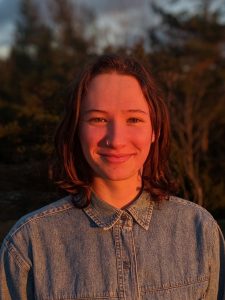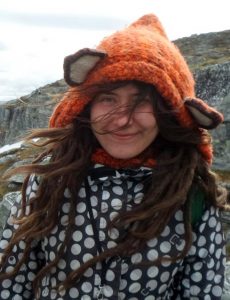Meet our trainees 2020

Vilja Jokinen
Genetics and Molecular Biosciences master’s student Faculty of Biological and Environmental studies
Master’s thesis research at Gynecological Tumor Genomics lab, University of Helsinki, Vahteristo group
I will make my master’s thesis project about leiomyomas. They are common benign tumors of uterine. I will be analysing RNAseq data for expression profiling and whole genome and exome sequences to understand genetic alterations in myomas. I am excited to learn more about tumorigenesis and genetic background of myomas. I am grateful for this unique opportunity to develop my understanding of tumor genetics and skills on bioinformatics.

Hannah Horten
Environmental Change and Global Sustainability master’s student Faculty of Biological and Environmental science
Master’s thesis research at Environmental Soil Science Unit, University of Helsinki
My master’s thesis will be about microbial methane cycling in northern boreal watershed soil. Methane is a really powerful greenhouse gas and microbes play an important role in its consumption and production. I will be using a combination of genetic and chemical analysis to figure out which and how many methanotrophs are present in the soil. I am really excited for all I will learn this summer.

Paavo Laitinen
Neuroscience master’s student at Faculty of Biological and Environmental Science
Master’s thesis research at Sleep and health lab, University of Helsinki, Paunio group
Patients with major psychiatric disorders have an increased prevalence of sleep problems. I will be studying different types of sleep problems in patients with schizophrenia and possible relationships between physical activity and quality of sleep. In practice this will mean analyzing actigraphy- and polysomnography data, which I am really looking forward to learning. In addition to the thesis work, I will also help with testing of new sleep monitors. Exciting times ahead!
 Colin Smith
Colin Smith
Microbiology and Microbial Biotechnology master’s student Faculty of Agriculture and Forestry
Continued collaborative research following thesis work at NASA’s Jet Propulsion Laboratory, Arctic Microbial Ecology Research Group, University of Helsinki
I recently return from a thesis internship at NASA’s Jet Propulsion Laboratory in Pasadena, California where I worked with the Planetary Protection group using MALDI-TOF MS to identify isolates captured on spacecraft within spacecraft assembly clean rooms. My work now is part of a continued collaboration between JPL and the University of Helsinki to perform Metapangenomic analysis of these isolates to identify genes conveying temperature and radiation resistance which may enable contamination of off-earth target bodies and hinder the search for extraterrestrial life.

Anna Their
Translational medicine master’s student at Faculty of Medicine
Master’s thesis research at Neuroprotection and neurorepair lab, University of Helsinki, Airavaara group.
For my master’s thesis I will be assessing endoplasmic reticulum (ER) reorganization and ER-mitochondria contact sites in stressed neurons. The ER, mitochondria and ER-mitochondria contact sites are important in the maintenance of intracellular calcium homeostasis. A dysfunction in these can have a devastating effect on the cells and this is, for example, associated with many neurodegenerative diseases. I will be using different stressors that are suspected to cause ER membrane reorganization in neurons, then analyze changes to the ER and quantify ER-mito contact sites. These stressors are widely used in various models of neurodegeneration and thus it is important to assess if and how changes in ER-mitochondrial dynamics relate to the degeneration of the neurons. I’m very grateful for this opportunity to further develop my skills by taking part in exciting and promising research.
 Katariina Järvinen
Katariina Järvinen
Translational Medicine master’s student at Faculty of Medicine
Master’s thesis research at Neuroprotection and Neurorepair lab, University of Helsinki, PI Helike Lõhelaid
I will join Helike Lõhelaid’s Academy of Finland project and the aim of my project is to establish a phagocytosis assay in vitro to identify phagocytosis facilitating genes with monocyte cell lines. Ischemic stroke causes rapid cell death in the affected area and removal of myelin and cell debris is a slow process hindering regeneration and recovery. Thus, we hypothesize that by facilitating phagocytic processes after stroke regeneration and recovery can be promoted. In addition, I am going to study how certain genes and the phagocytosis process itself modulates the activation state and oxylipin metabolism of monocytes, since oxylipin profiling determines the inflammatory phase of phagocytotic cells. I see this traineeship as an amazing opportunity to take part in medical research in order to identify and validate novel drug targets.
 Nora Bergman
Nora Bergman
Ecology and Evolutionary Biology student at the Faculty of Biological and Environmental Sciences
Master’s thesis research in Information ecology and co-evolution group
I am using a genomic data set to study the population structure and origins of reed warblers (Acrocephalus scirpaceus) in Finland. This migratory bird species is a local newcomer, the first individuals arriving to Finland no longer than 100 years ago. While colonizing Finland, the species expanded its northernmost range edge further up north.
The reed warbler is one of the numerous species that have experienced or are going to experience a range shift towards the poles under the current climate change. An expanding range front moves like a wave, in which successive founder effects can lead to strong genetic drift and lower allelic diversity at the wave front. This in turn can make adaptation more difficult and even stop the expansion.
With the opportunity given by the HiLIFE scholarship, I get to dig deeper into these topics in the Information ecology and co-evolution group. Using a fine-resolution RADseq data set, I hope to discover answers to the following questions: What are the origins and the spatial colonization history of the Finnish reed warbler population? How has this recent, rapid range expansion affected the population genetically?
 Piia Karhu
Piia Karhu
Food and Nutrition Science bachelor’s student Faculty of Agriculture and Forestry
I am a Food and Nutrition science bachelor’s student and I will conduct my HiLIFE traineeship in Viikki Molecular Nutrition group. The group focuses on the effects of nutrition on human health. I have always been very intrigued how diet affects our health and risk for different diseases so I am thrilled about this opportunity. My aim is to learn and understand more about how research is conducted, learn practical research skills as well as be more familiar how different diets and components in food affect our health in molecular and cellular levels.
 Essi Lahtinen
Essi Lahtinen
Genetics and Molecular Biosciences master’s student at the Faculty of Biological and Environmental science
Traineeship in a research project at the Institute of Biotechnology in Regenerative Neuroscience, Voutilainen group
Parkinson’s disease is a progressive and non-reversible neurodegenerative disorder. There is currently no treatment available that would stop the progression of this disease which severely impacts the quality of life of patients and their loved ones and leads to a high economic burden for healthcare. Neurodegenerative diseases are also becoming increasingly common due to increased life expectancy which is why it is so important to strive to develop effective therapeutic strategies against these pathologies. The HiLIFE scholarship is offering me an opportunity to research a topic of particular interest to me. During my traineeship, I will be involved in studying the effects of a neurotrophic peptide on rat models treated with neurotoxin 6-hydroxydopamine (6-OHDA) to mimic the pathology of Parkinson’s disease. I am very excited and grateful for this opportunity!
 Erin Rooney
Erin Rooney
Neuroscience master’s student at Faculty of Biological and Environmental Science
Masters Thesis research at Biology of Neuro-Immune Interaction Lab
Meningeal lymphatic vessels (mLVs), together with the glymphatic system, represent a unique and integrated network important for the homeostasis of the central nervous system (CNS). Recent studies have shown this network has a critical role in clearing the extracellular space of neuronal metabolic waste products and secreted macromolecules. This suggests mLVs can take part in the development and progression of neurodegenerative diseases.
The aim of my Master’s thesis project is to evaluate the relationship between mLVs functionality and neuronal activity. Modification of the extracellular space dramatically affects how neurons behave, both as single cells and as networks. Therefore, it is conceivable that alterations in the clearance ultimately modifies brain activity.
Using different approaches (including transgenic mice lacking functional mLVs and AAV vectors, to enhance or suppress the lymphatics) I will study in vivo how manipulation of the meningeal lymphatic network affects the basal neuronal activity, as well as its threshold to hyperexcitability. This will be done by taking cortical EEG recordings (in association with EMG) in different experimental conditions, during both wakefulness and sleep, and after the administration of pro-convulsant drugs. Analysis of EEG signatures (e.g., sleep spindles or epileptiform-like discharges) and of different band frequencies will provide a readout of the interaction between the mLV system and the CNS. I am very excited to have the opportunity to slip on a lab coat and acquire new laboratory skills under the guidance of some experienced researchers.
